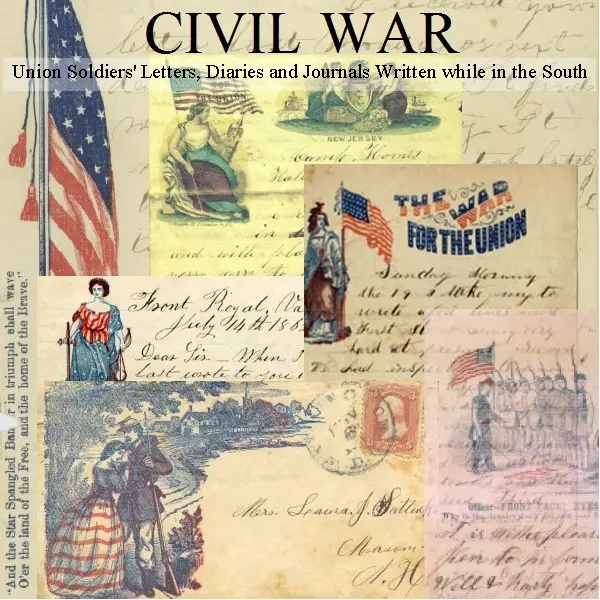
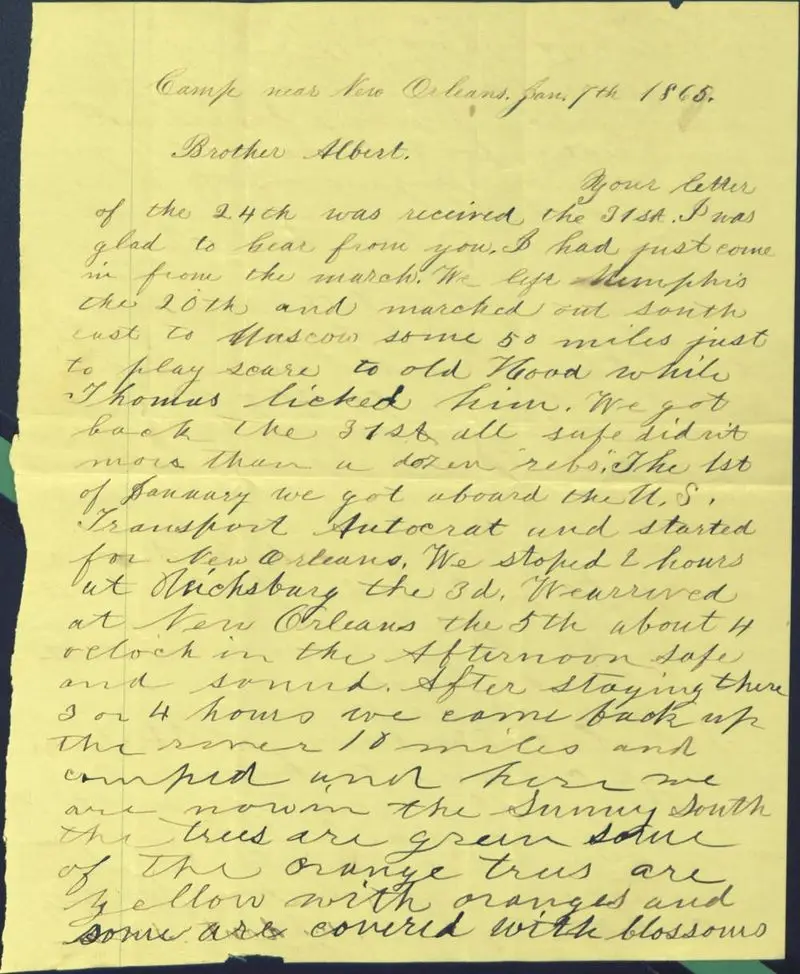
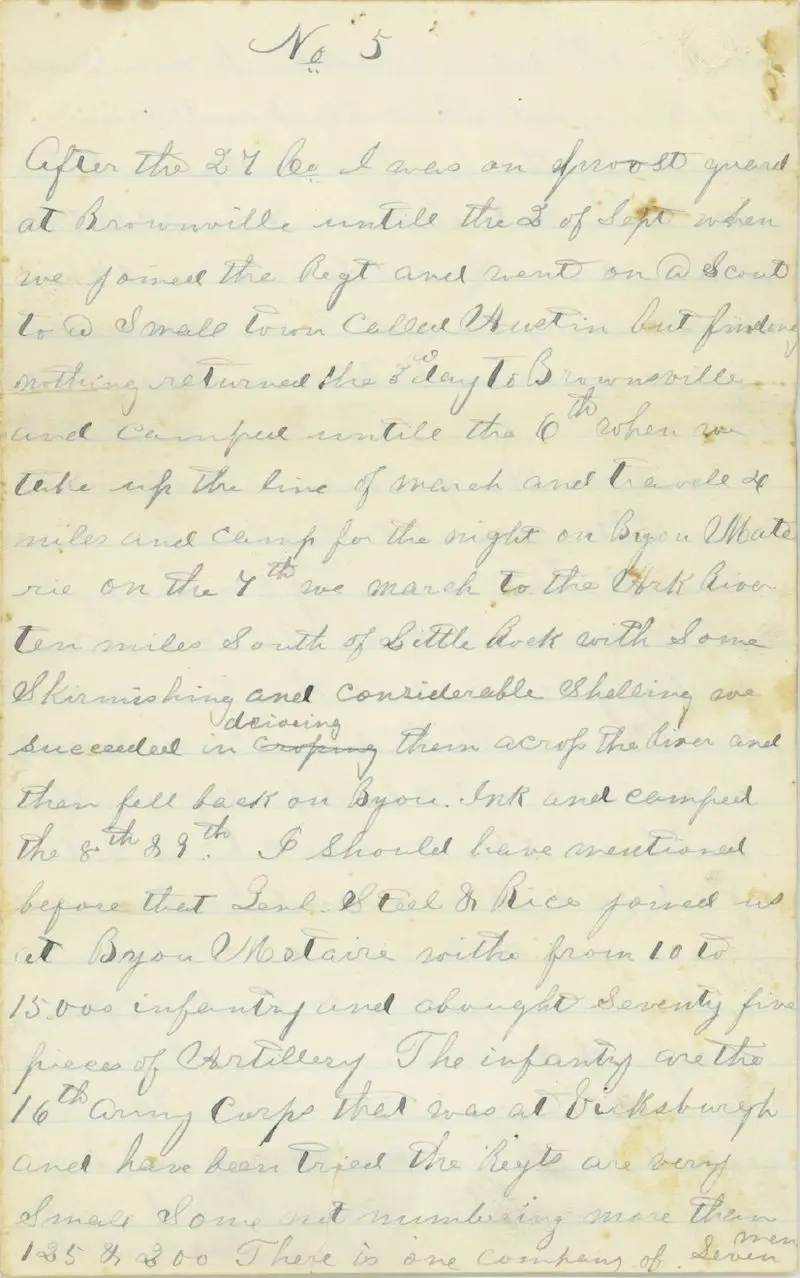
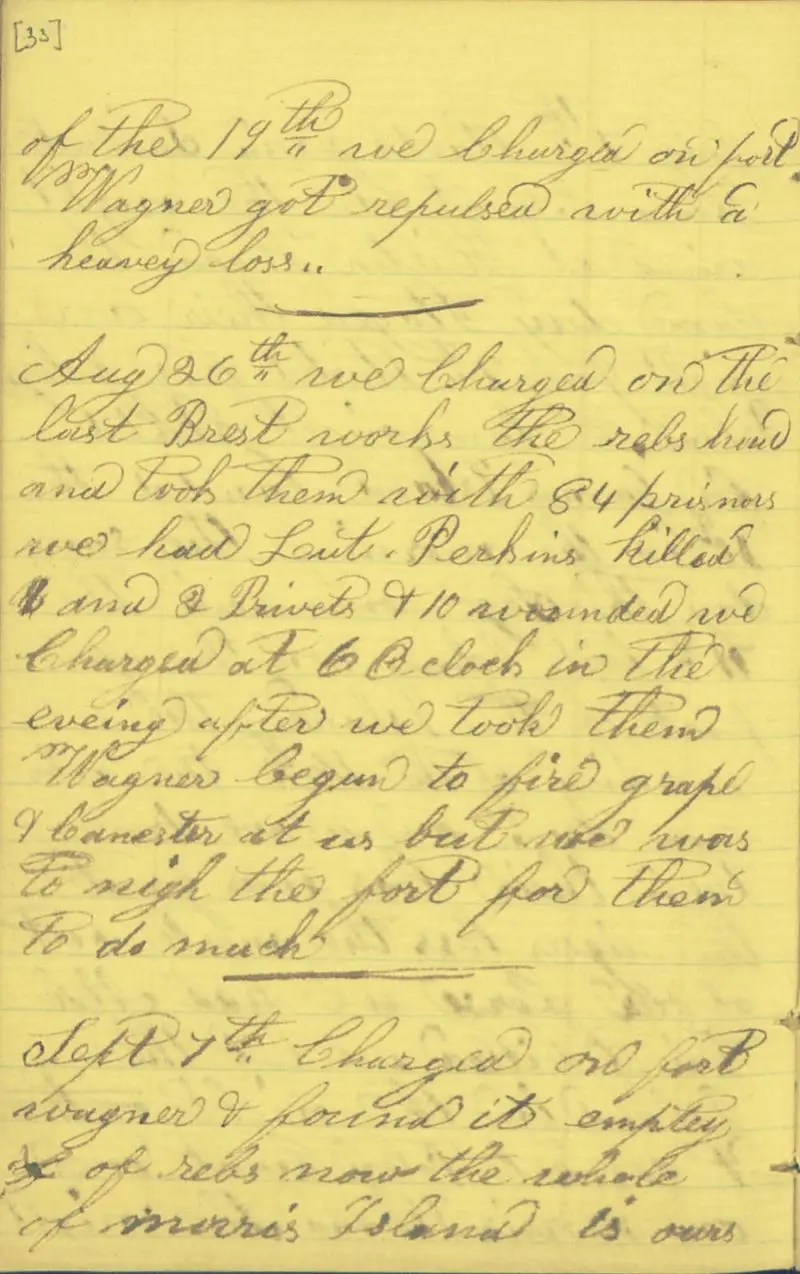
Civil War Union Soldiers’ Letters, Diaries, and Journals from Their Time in the South
$19.50
Description
Civil War Era Events and Figures, 1861-1865
Timeline of Events (1861-1865)
- 1861:Charles Carroll Gray serves at the Battle of Manassas.
- Emmett Cole participates in the Port Royal, South Carolina expedition.
- Charles William Dustan serves with the 71st New York Militia Regiment in Virginia.
- 1861-1862: Charles William Dustan serves as captain in the 53rd New York Infantry Regiment in Virginia, Mississippi, and Tennessee.
- 1862:Emmett Cole participates in the siege of Fort Pulaski, Georgia and the attack on Secessionville, South Carolina. Cole dies of wounds sustained in battle around the end of June in Charleston, S.C.
- Charles Carroll Gray is held in Confederate prisons, including Libby Prison in Richmond, VA and Castle Pinckney in Charleston, South Carolina.
- John H. Brown covers the military campaign in eastern North Carolina.
- J. Smith DuShane is wounded in the Second Battle of Manassas.
- Lt. John Sterne is wounded at the Battle of Corinth (October 4th) and dies on October 17th.
- 1863:John H. Brown covers the siege of Fort Johnson, S.C., and Fort Wagner, S.C. (July-September).
- Charles W. Hill writes about a conversation with a slave who escaped from Confederate General J. Johnston Pettigrew’s service (March 19th).
- J. Smith DuShane writes about the commandeering of the Confederate steamship Planter.
- James A. Burnett dies of cholera near Vicksburg (June 19th).
- Harvey Reid participates in campaigns against Morgan’s Confederate Cavalry in Kentucky.
- Douglas Ritchie Bushnell is killed in action at Ringgold, Georgia (November).
- Gould is wounded in the siege of Fort Hudson, Louisiana.
- 1864:Mahlon D. Cushman is captured at the Battle of Plymouth, North Carolina and sent to Andersonville Prison (May 2nd).
- Elias Perry’s diary covers Sherman’s March to the Sea (November 12th, 1864 – March 24th, 1865).
- 1864-1865: Harvey Reid participates in Sherman’s march through Georgia and the Carolinas.
- Post-War (Undated):Henry E. Simmons works as the principal of a freedmen’s school in Arlington, Virginia.
Cast of Characters
- John H. Brown: Union soldier in the 24th Massachusetts Infantry Regiment. His diary covers military campaigns in eastern North Carolina and the siege of Fort Johnson and Fort Wagner, South Carolina.
- Mahlon D. Cushman: Private in Company I of the 16th Connecticut Infantry Regiment. Captured at Plymouth, N.C., and imprisoned at Andersonville. His diary records his capture, arrival at Andersonville, prisoner deaths, food rations, and weather.
- Charles L. Hewitt: Union soldier in Company E, Connecticut 7th Infantry Regiment. His diary details the fate of 120 soldiers in his regiment, including those killed, wounded, promoted, or deserted. Also wrote letters to his family while on a gunboat.
- J.M. Drake: Union soldier in Company A, 4th Massachusetts Regiment. Wrote to his father about his desire to be discharged, misconduct by Union troops in Virginia, his assignment to bring back the dead from the battlefield under a flag of truce, and his participation in an attempt to capture Confederate Colonel Jones.
- Charles Carroll Gray: United States Medical Officer. His diary covers his service at the Battle of Manassas and his experiences as a prisoner in Libby Prison (Richmond, VA) and Castle Pinckney (Charleston, SC).
- Emmett Cole: Union soldier in Company F, 8th Michigan Infantry Regiment. Died from wounds sustained in battle in Charleston, S.C. Letters describe engagements at Port Royal (S.C.), Fort Pulaski (GA), and Secessionville (S.C.).
- James I. McCarter: Resident of Charleston, S.C. who visited Emmett Cole in a hospital and wrote to Cole’s father about his condition.
- Charles William Dustan: Son of Isaac K. Dustan. Served in the 71st New York Militia and as captain in the 53rd New York Infantry Regiment. Letters cover camp life, troop movements, morale, and discipline problems.
- Isaac K. Dustan: Captain of the steamer Atlantic. Father of Charles William Dustan.
- John Sterne: Union Lieutenant whose death was detailed in a letter to his father from six members of his company. He was wounded at the Battle of Corinth and later died.
- J. Smith DuShane: Sergeant in Company K of the 100th Pennsylvania Infantry Regiment. Letters to his future wife Adela cover events in South Carolina and Virginia, including the commandeering of the Confederate steamship Planter.
- Adela: Future wife of J. Smith DuShane.
- Charles W. Hill: Union soldier in the Massachusetts Volunteer Infantry. Wrote about a conversation with an escaped slave who served Confederate General J. Johnston Pettigrew.
- J. Johnston Pettigrew: Confederate General. An escaped slave once served as his servant.
- Henry E. Simmons: Sergeant in the 11th Rhode Island. Letters cover religious efforts among soldiers and observations of black laborers. Later worked as the principal of a freedmen’s school in Arlington, Virginia.
- James A. Burnett: Union soldier in Co H, 26th Regiment of Missouri. Died of cholera near Vicksburg. Letters discuss criticisms of war management and health problems in his regiment.
- Douglas Ritchie Bushnell: Union soldier in the 13th Illinois Infantry. Killed in action at Ringgold, Georgia. Letters cover campaigns in Missouri, Arkansas, Louisiana, Mississippi, Alabama, and Tennessee.
- Elias Perry: Union Lieutenant whose diary covers Sherman’s March to the Sea.
- Gould: A hospitalized Union soldier. Wounded during the siege of Fort Hudson, Louisiana.
- Harvey Reid: Union soldier in the 22nd Wisconsin Infantry Regiment. Participated in campaigns against Morgan’s Confederate Cavalry in Kentucky and Sherman’s march through Georgia and the Carolinas.
- Colonel Jones: Confederate Colonel whom some Union soldiers (including J.M. Drake) attempted to capture.
Civil War Union Soldiers’ Letters, Diaries, and Journals from Their Time in the South
The collection consists of 6,358 pages of letters and handwritten diary entries from 98 Union soldiers and officers, primarily composed while they were in the South during the Civil War.
This collection highlights Federal soldiers engaged in considerable combat within the Confederate states. The writings originated from various locations across the South, including camps, hospitals, and prisons.
Notable entries include:
John H. Brown – 24th Massachusetts Infantry Regiment – His diary documents the military operations in eastern North Carolina towards the end of 1862, as well as the sieges of Fort Johnson and Fort Wagner in South Carolina between July and September of 1863. The diary contains accounts of marches, tactical movements, casualties, and deaths, with mentions of African American losses, possibly from the 54th Massachusetts Infantry Regiment.
Mahlon D. Cushman – Private in Company I of the 16th Connecticut Infantry Regiment – Following his unit’s surrender at Plymouth, N.C., Cushman was transported to Andersonville Prison. In his pocket diary, he detailed his capture by Confederate troops during the Battle of Plymouth and his arrival at Andersonville on May 2, 1864. He recorded the deaths of numerous fellow prisoners and noted his daily food rations and weather conditions.
Charles L. Hewitt – Company E, Connecticut 7th Infantry Regiment – Hewitt’s diary recounts the experiences of 120 soldiers he served alongside in the Connecticut 7th Infantry. It provides specifics such as dates and locations of those killed, injured, promoted, or who deserted. The collection also includes letters Hewitt wrote to his family while aboard a gunboat. J.M. Drake, serving in Company A of the 4th Massachusetts Regiment, writes to his father expressing his desire to be discharged. He mentions the misconduct of Union soldiers in Virginia, his duty under a flag of truce to retrieve bodies from the battlefield, and his involvement in an effort to capture Confederate Colonel Jones at his residence.
Charles Carroll Gray, a United States Medical Officer, kept a diary during 1861 and 1862 that details his experiences at the Battle of Manassas. He was later imprisoned by the Confederates, spending time in Libby Prison in Richmond, Virginia, and Castle Pinckney in Charleston, South Carolina. His diary is notably thorough, particularly regarding the medical conditions of fellow prisoners and the interactions between inmates and their guards.
Emmett Cole served in Company F of the 8th Michigan Infantry Regiment and likely died from injuries sustained during combat in Charleston, South Carolina, around late June 1862. His letters describe various military engagements he took part in, such as the Port Royal expedition in 1861, the siege of Fort Pulaski, Georgia, in 1862, and the attack on Secessionville, South Carolina, also in 1862. The correspondence also reflects on life in the military, anecdotes about encounters between Union and Confederate troops on picket duty, thoughts on the conduct and possible length of the War, and discussions regarding financial issues. Additionally, there is a letter from James I. McCarter in Charleston, South Carolina, who visited Cole in a hospital for wounded soldiers and wrote to inform Cole’s father of his son’s critical state. Charles William Dustan – Dustan was the child of Isaac K. Dustan, who captained the steamer Atlantic. During the Civil War, Dunstan initially served with the 71st New York Militia Regiment in 1861 before becoming a captain in the 53rd New York Infantry Regiment from 1861 to 1862, operating in Virginia, Mississippi, and Tennessee. His correspondence discusses camp life, troop movements, morale, discipline issues, including a mutiny in the 53rd Regiment, and the conditions and events in Memphis.
To the Father of Lt. John Sterne – A group of six members from Sterne’s company came together to compose a letter to his father detailing his death on October 17, 1862, due to a wound sustained during the Battle of Corinth on October 4, 1862.
- Smith DuShane – DuShane served as a sergeant in Company K of the 100th Pennsylvania Infantry Regiment. His service primarily took place in South Carolina and Virginia. In letters to his future wife Adela, he discusses the seizure of the Confederate steamship Planter by its slave pilot, the resistance from Fredericksburg residents, and soldiers’ retribution against “land shark” vendors who trailed the regiment in Virginia. After being injured in the Second Battle of Manassas, he recounts the circumstances leading up to his wounding.
Charles W. Hill – Serving in the Massachusetts Volunteer Infantry, Hill wrote a letter on March 19, 1863, in which he describes a conversation with an escaped slave who had been a servant for Confederate General J. Johnston Pettigrew.
Henry E. Simmons – As a sergeant in the 11th Rhode Island, Simmons’s letters focus on his religious outreach among fellow soldiers and his insights into black laborers working for the army. His later correspondence details his role as the principal of a school for freedmen in Arlington, Virginia. James A. Burnett served in Company H of the 26th Regiment of Missouri. He passed away from cholera at a field hospital close to Vicksburg on June 19, 1863. His correspondence reveals his critiques of wartime management, concerns over his regiment’s health, and dissatisfaction with collaborating alongside Black regiments.
Douglas Ritchie Bushnell was part of the 13th Illinois Infantry. He lost his life in combat at Ringgold, Georgia, in November 1863. His letters were composed during military operations across Missouri, Arkansas, Louisiana, Mississippi, Alabama, and Tennessee.
Lieutenant Elias Perry kept a diary that details Sherman’s March to the Sea, spanning from November 12, 1864, to March 24, 1865.
Gould, a soldier hospitalized during the conflict, wrote to a friend about the siege of Fort Hudson in Louisiana, where he sustained injuries and a significant portion of his regiment was lost.
Harvey Reid served in the 22nd Wisconsin Infantry Regiment. He took part in campaigns against Morgan’s Confederate Cavalry in Kentucky in 1863, and subsequently joined Sherman’s march through Georgia and the Carolinas
Related products
-
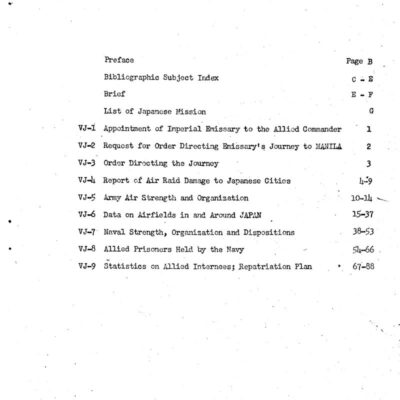
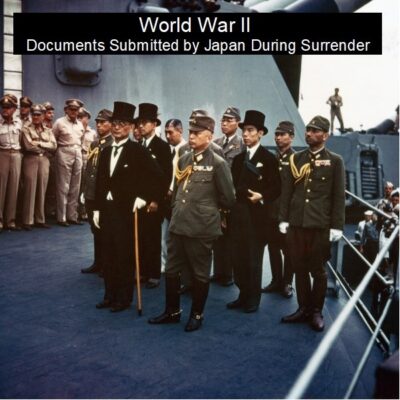
Japan’s Surrender Documents from World War II
$1.99 Add to Cart -
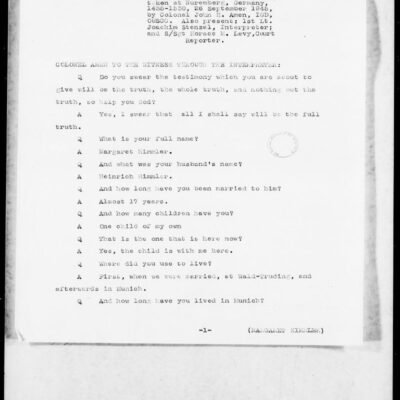
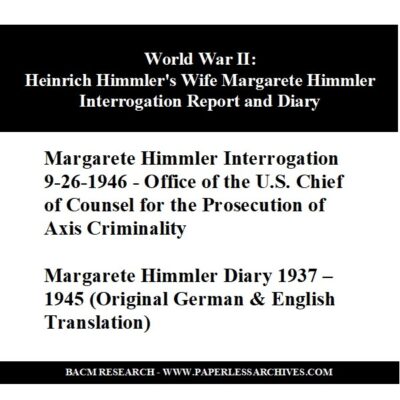
World War II: Interrogation Report and Diary of Margarete Himmler, Wife of Heinrich Himmler
$3.94 Add to Cart -
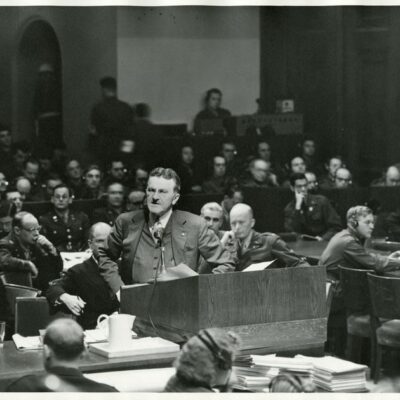
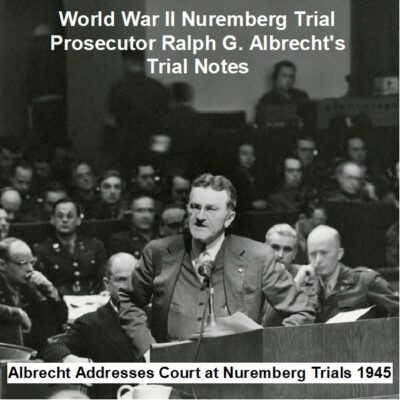
Trial Notes of Ralph G. Albrecht, Prosecutor at the Nuremberg Trials of World War II
$3.94 Add to Cart -
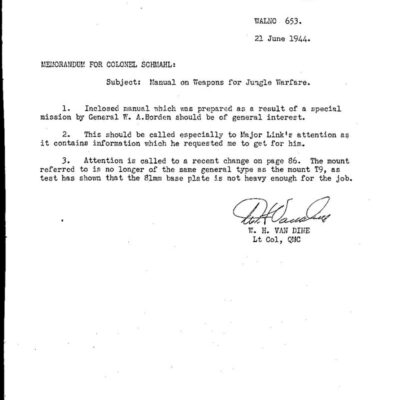
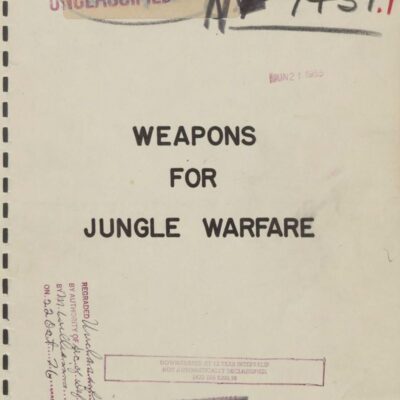
World War II Manual on Weapons for Jungle Warfare (1944)
$1.99 Add to Cart